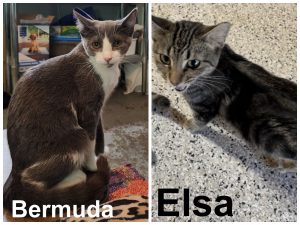Will you help us save these cats?
Curing FIP is an expensive, specialized treatment that lasts a total of 164 days, if no complications prolong treatment. Up until just a few years ago, treatment wasn't even an option and FIP had a 100% mortality rate for every cat that developed it.
After our own personal experiences losing cats to FIP because there was no treatment available to us, we couldn't let a high price tag stop us from doing everything possible to not lose another cat to FIP as long as an option existed to save them.
Our current FIP cats receiving treatment:

Each cat receives one GS-441524 injection each day for 84 days. GS is not an approved medication in the US, so it is not easily obtained and the cost is high at $45 per 5ml vial.
Dosage is based on weight, so as the treatment works and cats put on weight, they require a larger dosage which means the daily cost of treatment will increase slightly over time.
In addition to these injections, cats being treated have to have bloodwork done every few weeks to ensure that they are improving and so we can adjust their treatment plan when or if it is necessary.
While we have successfully treated and cured multiple cats of FIP, there is never a guarantee of success and we don't know what complications we may run into as we treat them.
If you would like to donate to any of our cats' care, we accept donations via our Facebook page, PayPal, Venmo, or via snail mail at 4247 North State Road 135 Franklin, IN 46131
**What is FIP?
According to Cornell Feline Health Center: “Feline infectious peritonitis (FIP) is a viral disease of cats caused by certain strains of a virus called the feline coronavirus. Most strains of feline coronavirus are found in the gastrointestinal tract and do not cause significant disease. These are referred to as feline enteric coronavirus (FeCV). Cats infected with FeCV usually do not show any symptoms during the initial viral infection, but may occasionally experience brief bouts of diarrhea and/or mild upper respiratory signs from which they recover spontaneously. FeCV-infected cats usually mount an immune response through which antibodies against the virus are produced within 7-10 days of infection. In approximately 10 percent of cats infected with FeCV, one or more mutations of the virus can alter its biological behavior, resulting in white blood cells becoming infected with the virus and spreading it throughout the cat’s body. When this occurs, the virus is referred to as the FIPV. An intense inflammatory reaction to FIPV occurs around vessels in the tissues where these infected cells locate, often in the abdomen, kidney, or brain. It is this interaction between the body’s own immune system and the virus that is responsible for the development of FIP. Once a cat develops clinical FIP, the disease is usually progressive and almost always fatal without therapy that has recently become available, but that has yet to be approved to treat FIP in cats by the Food and Drug Administration (FDA).”.